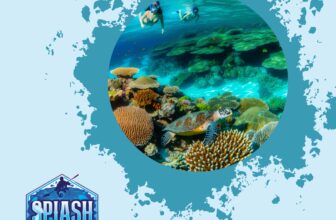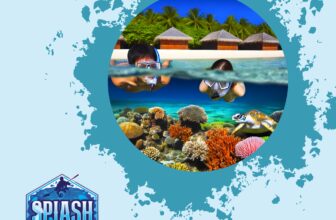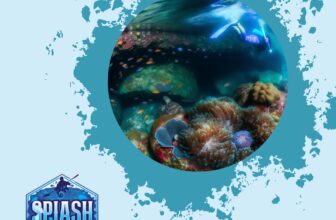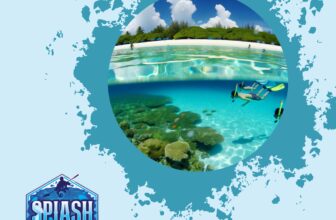
Scuba diving is an exciting and adventurous activity that gives individuals a chance to explore the underwater world. The sport involves using equipment to breathe underwater, allowing divers to explore the depths of oceans, seas, lakes, and rivers. While scuba diving can be extremely rewarding, it also presents several challenges that novice and experienced divers alike must overcome.
Definition of Scuba Diving
Scuba diving is a type of underwater diving that uses self-contained underwater breathing apparatus (SCUBA) equipment for breathing purposes. Unlike snorkeling, which only allows exploration near the surface of water bodies, scuba diving permits divers to reach greater depths and stay submerged for extended periods. The activity requires specialized training and certification from recognized diving agencies like PADI and SSI before individuals can engage in it safely.
Importance of Understanding the Difficulty Level of Scuba Diving
The importance of understanding the difficulty level involved in scuba diving cannot be overstated. It is an essential step towards being a safe diver who can navigate various challenges that arise during dives effectively. Scuba diving demands physical fitness, psychological preparation, technical proficiency with equipment handling and mastery of safety protocols.
Thesis Statement
This article seeks to examine the various challenges posed by scuba diving such as physical demands on divers’ bodies; psychological factors affecting their mental states; technical skills required for effective navigation under water; environmental issues like temperature variations or unexpected emergencies encountered during expeditions. By highlighting these factors in detail, this article will help potential or new divers better understand what they are getting into when they decide to take on one of the most exciting activities known to humanity – scuba-diving!
The Physical Demands of Scuba Diving
The effects of water pressure on the body
When you enter the water, you are exposed to increased pressure, which has a significant impact on your body. The deeper you go, the more pressure your body must withstand.
This increase in pressure can lead to a variety of physical effects such as ear pain, sinus squeeze, and even decompression sickness. Ear pain is caused by the difference in pressure between the air inside your ear and the water outside.
It is important to equalize this pressure by using proper techniques like swallowing or pinching your nose and blowing gently. Sinus squeeze occurs when your sinuses cannot equalize with the surrounding pressure, causing discomfort or even injury.
You can avoid this by descending slowly and equalizing frequently. Decompression sickness occurs when nitrogen bubbles form in your bloodstream due to a sudden drop in ambient pressure.
This can cause fatigue, joint pain, dizziness, and even death in severe cases. To prevent this dangerous condition from occurring, divers must follow strict guidelines for ascent rates and decompression stops.
The impact of underwater currents and waves on divers
Strong currents or waves can be challenging for even experienced divers. They can make it challenging to control buoyancy and move through the water safely.
In some cases, currents may push divers off course or into dangerous areas like sharp rocks or coral reefs. To navigate underwater currents successfully takes special training that includes techniques such as using reef hooks to anchor yourself while observing marine life without being swept away; using drift diving techniques that allow you to flow with ocean currents while staying safe; mastering kick techniques that allow you to swim against strong currents; and knowing how much weight is needed based on current strength.
The need for physical fitness and stamina
Scuba diving requires physical exertion that involves both swimming underwater and carrying heavy equipment. Divers must be in good shape to handle the physical demands of diving.
Underwater movements also burn more calories and require more oxygen than on land, which can lead to fatigue and exhaustion. Divers who are not in good physical condition may be at risk for decompression sickness or other injuries because of their inability to perform necessary tasks like swimming against strong currents or carrying heavy equipment.
To prevent these types of injuries, divers must maintain a regular fitness routine that focuses on cardiovascular endurance, strength training, and flexibility exercises. This helps divers improve their stamina and reduces the risk of injury during a dive.
Psychological Challenges in Scuba Diving
Scuba diving can be a thrilling and rewarding experience, but it also comes with its own set of psychological challenges. Overcoming fear and anxiety, managing stress and panic, and maintaining focus and concentration are all crucial skills for divers to develop.
Overcoming Fear and Anxiety
For some people, the idea of diving underwater can be intimidating or even terrifying. Fear of the unknown or fear of water can be overwhelming. However, overcoming these fears is crucial to becoming a confident diver.
One way to do this is through taking scuba diving courses that teach breathing techniques, safety protocols, and how to handle emergency situations. Another helpful tool for overcoming fears is visualization.
Taking time before a dive to imagine yourself succeeding in the dive can help reduce anxiety. Talking with other divers who have experienced similar fears can also be helpful.
Managing Stress and Panic Underwater
Scuba diving requires attention to detail, focus, and concentration—skills that may be challenged by high levels of stress or panic underwater. In some cases, divers may experience claustrophobia or feelings of being trapped while submerged.
Proper training in breathing techniques such as controlled exhalation (known as “purging”) can help alleviate stress by lowering carbon dioxide levels in the body. Other techniques include focusing on positive thoughts or counting breaths to stay calm during stressful situations.
Maintaining Focus and Concentration
Divers must remain focused on their surroundings at all times while underwater, assessing depth changes or changes in currents around them. Distracted divers may miss out on important safety information given by their dive partners or miss potential hazards such as rocky outcrops or marine life.
Visualizing the dive beforehand is an effective technique for maintaining focus during a dive. Another technique includes keeping a clear mind by avoiding negative thoughts or worries about the dive.
Focusing on one’s breath and maintaining a steady rhythm can also help with concentration. Scuba diving comes with its own set of psychological challenges, which are just as important to overcome as physical challenges.
Divers should practice techniques such as breathing exercises, visualization, and positive thinking to combat fear, stress, and distraction during dives. By mastering these skills, divers can make the most out of their underwater experiences while staying safe and in control of their emotions.
Technical Skills Required for Scuba Diving
Scuba diving requires a great deal of technical skill and knowledge, and it’s important to be properly trained before attempting any dive. Here are some of the key technical skills required for scuba diving:
Understanding dive equipment and its proper use
To scuba dive safely, you need to understand the different types of equipment used in diving and how they work. This includes understanding the basic components of your scuba gear, such as your regulator, BCD (buoyancy control device), mask, fins, and tanks. You also need to know how to properly assemble, disassemble, and maintain your equipment.
For example, you should know how to check your regulator for leaks or damage before every dive. You should also be able to adjust your BCD for proper buoyancy control during a dive.
Mastering buoyancy control techniques
Buoyancy control is essential in scuba diving because it allows you to hover effortlessly in the water at any depth. To master this skill, you need to learn how to adjust your buoyancy using both your BCD and breathing techniques. One technique that can help with buoyancy control is called “neutral buoyancy,” which means that you are neither sinking nor floating but hovering in one place.
To achieve neutral buoyancy underwater requires practice and patience. It’s important not only for safety reasons but also because good buoyancy control will help prevent damage from touching delicate marine life or kicking up sediment on the ocean floor.
Navigating underwater with a compass
Navigating underwater with a compass is crucial when exploring new dive sites or searching for specific features like shipwrecks or reef formations. Learning how to use a compass correctly will keep you from getting lost underwater.
To navigate properly with a compass requires knowing what direction you’re facing and what direction you need to go. You’ll need to learn how to set your compass properly, take bearings from underwater landmarks, and control your buoyancy while navigating.
It’s also important to practice good compass skills in different environments, such as open water or enclosed spaces like caves or wrecks. It can be challenging even for experienced divers under low-visibility conditions, so it’s essential never to dive into any environment that you are not comfortable with and properly trained for.
Environmental Factors That Affect Scuba Diving Difficulty
Water Temperature, Visibility, and Depth
Scuba diving exposes divers to different water temperatures, visibility levels, and depths which can pose a significant challenge to experienced as well as inexperienced divers. The temperature of the water can range from warm to cold depending on the location, season or time of day.
Cold water temperatures demand the use of thicker wetsuits that require more energy and greater buoyancy control than thin suits used for warmer waters. Visibility can be affected by various factors such as weather conditions, currents or tides and marine life movement.
Low visibility can lead to disorientation making it difficult for divers to navigate through tight spaces such as caves or wrecks. Depth also plays a substantial role in scuba diving difficulty level with greater depths requiring longer decompression stops.
Marine Life Encounters: Sharks and Jellyfish
Scuba diving in open water offers an opportunity for divers to come into contact with marine life such as sharks or jellyfish. While these creatures are often misunderstood, encountering them can be an intimidating experience even for seasoned divers.
Sharks are known to have an acute sense of smell and are attracted by strong odors like blood or fish bait which might provoke them into action towards a diver nearby. Jellyfish stings on the other hand cause mild irritation at best but in some cases lead to serious medical emergencies if left untreated.
Dealing With Unexpected Emergencies: Equipment Failure or Getting Lost
Scuba diving is not without its risks which unfortunately include emergencies like equipment failure or getting lost underwater. Some common equipment malfunctions include regulator failure leading to air shortages among other things such as uncontrolled ascent rates due to inaccurate depth gauge readings or mask leakages leading to impaired vision underwater making navigation difficult.
Getting lost while scuba diving is also a real possibility especially in low visibility locations. The best way to deal with these situations is to undergo rigorous training and obtain certification that prepares divers for such emergencies.
Conclusion
Scuba diving is a fun, exciting and rewarding experience that offers an opportunity for exploration of the underwater world. However, it’s important to understand the risks associated with diving before taking part in this activity.
Physical demands, psychological challenges, technical skills requirements, and environmental factors all work together to make scuba diving a challenging but worthwhile pursuit. By following proper training protocols and safety guidelines, divers can reduce their risk of accidents while enjoying the magnificence of the underwater world.







